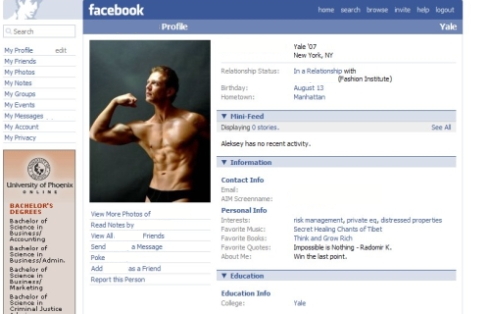
Take this from a guy who still uses vi to write raw C code, Facebook is way over-hyped. Now, having read the salient points of the S-1 (this is the document filed with the Securities and Exchange Commission on intent for public stock offering) I can’t deny that the numbers are fabulous.
Here’s the thing: So were AOL’s on the eve of its public offering. I’m talking pre-Time-Warner AOL, the company that reminded you of their existence each and every day when you went to the mail box where there was at least one disc with 10 hours of free AOL if only you installed their malware.
Since many of you have missed previous hype cycles, it’s important to watch for patterns and trends across industries and companies. In the 1990’s, AOL was a darling creating a proprietary and safe online experience, with a community of people closely connected and an ecosystem of partners making money hand over fist. AOL was the 3rd incarnation of this effect that started off with private bulletin-board-systems (BBS’s) in generation one. Compuserve commercialized and scaled this as wave two. Prodigy (failed) and AOL (succeeded) represented the third wave. The major difference was that the experience was available to the larger, non-technical community and it did everything possible, even with the rise of the general internet, to keep users inside the AOL bounds. We see how that worked out, not very well.
Flash forward into the 2000’s and we see a similar trend. Wave one consists of various niche community sites, all fragmented and frothy. Wave two has a flag bearer in the form of Friendster bringing peer-to-peer to friendships to the forefront. Wave three has two major players, MySpace (failed) and Facebook (succeeded).) Like AOL, Facebook has an ecosystem where partners are making money, for now. Like AOL, Facebook brought social networking to the non-technical masses. Like AOL, Facebook does everything in its power to trap users in their curated and proprietary Facebook experience. Like AOL, the signal to noise ratio approaches zero with prolonged exposure – the amount of douchebaggery increases exponentially with the number of active community members.
So yes, the numbers are stunning. Today. And perhaps for some short period of years into the future. My bet is that Facebook doesn’t have a sustainable competitive advantage that will allow for this sort of financial performance over the long haul. I hope the FB team gets a great pay day, they’ve created a big, profitable monster.
But, I wouldn’t be long in the stock anymore than I would participate in the Facebook community routinely. I believe a free, uncurated, non-commerically oriented alternative will emerge (G+ – maybe?) and will erode their base just as Facebook eroded MySpace and Friendster. And then we’ll be along to the next wave. My bet on the next wave is micro-communities with extremely focused and committed membership in a large, horizontally scaling public infrastructure.
So no, I’m not drinking the Facebook cool-aid. Caveat Emptor.









Thanks for tweeting link to my Forbes blog with the bull case for Facebook. It will be interesting to see if you remain a non-Facebook user. That may become, practically speaking, impossible. If trends continue very likely email will be a poor way for communicating, as people will gather most contacts via Facebook. Search may become obsolete as we depend upon referrals from those we know for information, rather than sterile math programs going through key words. Additionally, many companies are likely to stop spending money on web sites with struggling traffic in favor of Facebook pages that are cheaper, and easier to target at buyers. If you become a Facebook user your opinion about its value may well change.
I don’t think it is the technology that makes facebook valuable, but rather its enormous appeal to advertisers. They are looking for more efficient and effective way to reach buyers and build a brand, and Facebook is a good tool.
AOL could have been Fcebook. As you point out, it once was the content aggregator of choice. What went wrong at AOL was an inability to migrate with the trends, do a better job of finding and pushing content and keep its user base. AOL remained stuck in its original model, and market shifts made it obsolete. Now, however, with Huffington Post AOL is rapidly changing and may make a very substantial comeback. It is definitely attracting more advertisers – but not as many as Facebook.
A virtuous circle develops when a “platform” becomes dominant. People use it because everyone else uses it, which brings business users to it and expands the uses, and users, even more. The next 5 years already look to be the years of Facebook dominance as a platform, and as revenues grow I would presume they will kick out many new products as Google and Apple have done.
For your readers who want to read my bullish case for Facebook, and recommendation to buy the IPO here’s the link http://onforb.es/yfj6YW
Thanks again!!
Hi Adam,
Thanks for dropping by my humble blog and more importantly, for leaving such a content-rich and thoughtful comment. For the record, I do have a Facebook account and have had one since the 2006 time frame. Your perspective about platform dominance and advertising from the bull case you posted this morning in Forbes has real merit and should cause any investor to seriously consider taking a position in Facebook.
Perhaps I’m seeing this from a personal perspective where Facebook is more of an annoyance than a help. I recently connected my Twitter account to share status on FB. It’s been an interesting experience in that there is more interaction per update on FB, but from a much smaller set of people.
I’ll reconsider my position in light of your perspective. It will be fun to see how this all turns out!
Best,
mh